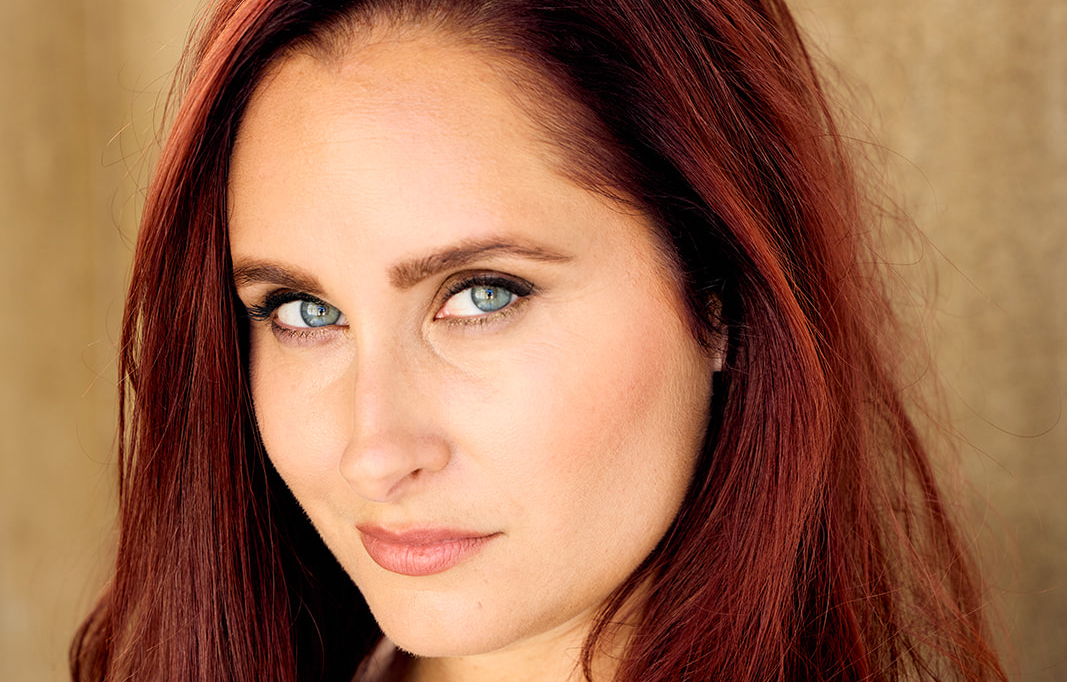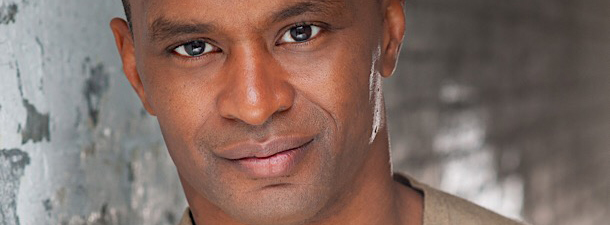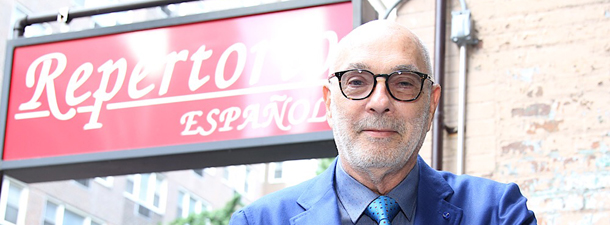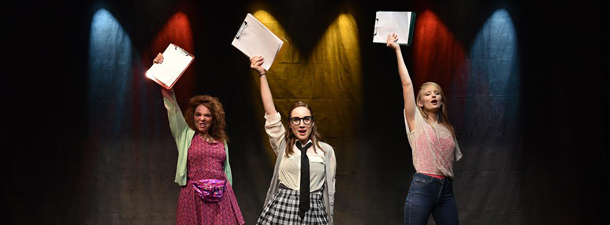Israel’s Gesher Theatre Returns to New York

Israel’s Gesher Theatre Returns to New York with “The Dybbuk” and “In the Tunnel” in October 2018 as Part of Three-City Tour
Israel’s acclaimed Gesher Theatre will return to the US and Canada, with performances in Toronto, New York City and Pittsburgh, September 29 through October 12, 2018, with its two leading productions, “The Dybbuk” and “In the Tunnel.” In New York, “The Dybbuk” and “In the Tunnel” will be presented at the Gerald W. Lynch Theater at John Jay College (524 W. 59thStreet) as part of the Cherry Orchard Festival. The Gesher Theatre productions are performed in Hebrew with English and Russian surtitles.
The company begins its New York City engagement with a new production inspired by “The Dybbuk” or “Between Two Worlds” by S. Ansky in a modern version written by Roy Chen, Gesher Theatre chief dramaturge. “The Dybbuk” written in 1913 and arguably the most iconic play of the entire canon of Jewish drama, tells the story of a young Hasidic woman who became possessed on the eve of her wedding by the dead spirit of her beloved, a young scholar whom her parents forbade her to marry. The esteemed Gesher Artistic Director Yevgeny Arye directs the cast of 25 performers. The play will run on October 3 and 4 at 8pm.
“The Dybbuk” will be followed by the political satire “In the Tunnel” also by Mr. Chen, inspired by the Best Foreign Language Oscar-winning film “No Man’s Land” by Danis Tanovic. Two Israeli soldiers and two Palestinians are trapped in a tunnel dug by Hamas between Gaza and Israel. Enemies snared in a mousetrap, they try to find their way out. Should they kill or save each other? Meanwhile, above ground, a political and media circus is attempting to capture and cover the event. The cast of nine is directed by award-winner Irad Rubenstein. The show will playon October 6 at 8pm and October 7 at 2pm.
Tickets are between $55 and $250 and are available online at CherryOrchardFestival.org.
The Gesher Theatre was founded in 1991 by director Yevgeny Arye and a troupe of Russian actors, who in pursuit of artistic freedom, immigrated to Israel from Moscow. In its early days, the theatre served as one of the few bilingual theaters in the world, staging every play both in Hebrew and in Russian. Today, Gesher Theatre performs solely in Hebrew, while still maintaining its close ties with the Russian culture and heritage. Over the years and under Arye’s leadership as Artistic Director, the Gesher Theatre has won a place of prominence in the Israeli cultural scene as well as in the international arena. In 27 years of existence, Gesher Theatre has created more than 100 theatre productions which have won numerous awards and appeared on the world’s most prominent stages and festivals. As befits its name, which means “bridge” in Hebrew, Gesher Theatre sees its goal as being a source of integration in Israel multicultural society, promoting new generations of young theatre artists and presenting a repertoire composed of world classics alongside well-known texts from Jewish literature.
Born in Moscow in 1947, Yevgeny Arye studied psychology at the University of Moscow and later studied directing at the Leningrad State Institute of Theatre Music and Cinematography. He directed plays for leading theatres in Moscow and Leningrad. In 1990, he emigrated to Israel and founded the Gesher Theatre, one of the only bilingual repertoire theatres in the world and has served as its Artistic Director since 1991. Over the years, he has directed over 45 plays at the Gesher Theatre and served as a guest on several occasions at prestigious theatre schools, including the Juilliard School and the NYU Tisch School of the Arts, as well as at the Faculty of Drama at Tel Aviv University and at the European Drama Institute in Paris. His work has earned him numerous awards and honors.
Yevgeny Arye, Ron Chen, and Lena Kreindlin recently discussed their work and more via an exclusive interview.
Meagan Meehan (MM) of Entertainment Vine: How did you get your start in theater?
Roy: When I was a kid I studied at Tel-Aviv Art School. I knew that my place was not on stage but behind it. I always wanted to play with words more than with people. Since the age of 14, I have been wearing three hats at the same time: as a writer, playwright, and translator.
MM: Tell me more about your roots as an actor in Russia, then coming to Israel, and establish a multi-national theater company?
 Yevgeny: I actually never dreamed about an acting career. I really do not remember where this idea came from, but at the age of 13, I knew for sure that I wanted to become a stage director. After finishing my studies at school with a gold medal, I was forbidden to pass entering exams to the Faculty of stage directing of the State Institute of Theatre Arts in Moscow because of my “very young age and lack of working experience.” That’s why I decided to become a psychologist and entered the Department of Psychology of the Moscow State University. It was a great time because studies in psychology had been forbidden for a long period in the USSR. As they were renewed I somehow miraculously managed to be with the first set of students.
Yevgeny: I actually never dreamed about an acting career. I really do not remember where this idea came from, but at the age of 13, I knew for sure that I wanted to become a stage director. After finishing my studies at school with a gold medal, I was forbidden to pass entering exams to the Faculty of stage directing of the State Institute of Theatre Arts in Moscow because of my “very young age and lack of working experience.” That’s why I decided to become a psychologist and entered the Department of Psychology of the Moscow State University. It was a great time because studies in psychology had been forbidden for a long period in the USSR. As they were renewed I somehow miraculously managed to be with the first set of students.
The main thing in the social life of the Department of Psychology was our Students’ Theater – we had a large rehearsal hall. All professors and lecturers, including the dean, were eager to be present at our performances.
After watching in Moscow a play directed by Georgy Tovstonogov, the leader of Saint Petersburg Bolshoi Academic Theatre of Drama, I understood that he had to be my teacher. It was not simple because Tovstonogov recruited students only once in four years! So, I had to fulfill my diploma paper and graduate from the University not in five years, but only in four. I did that, and moved to Leningrad I found out that thousands of young people were auditioned at Tovstonogov’s art laboratory for one place.
As a result, I spent ten years in Leningrad. I finished my studies and began to work as a stage director. Then at the beginning of the 1980s together with my wife, I filed documents for departure to Israel, but we were refused to leave the USSR. We were let go abroad only after being “refuseniks” for almost ten years! With our little son, we immigrated to the United States and I began to lecture at a theatre school in New York, but then I got a message from my friend in Israel, Nathan Sharansky. He invited me to establish a theater in Israel. It was the beginning of the last big Alia. All the rest is known.
MM: How did you get involved with Gesher?
 Roy: I came to Gesher at first as an audience member, then I started to work as a speech coach for actors who came from Russia, then as a translator, and for the last 10 years I’m the Chief Dramaturg and the house playwright of the theatre.
Roy: I came to Gesher at first as an audience member, then I started to work as a speech coach for actors who came from Russia, then as a translator, and for the last 10 years I’m the Chief Dramaturg and the house playwright of the theatre.
MM: Why did you choose “The Dybbuk” and “In the Tunnel” for the North American tour?
Roy: In a way, both plays tell our story – the past and the present. A Jewish fairy tale and a modern political satire.
Lena: I believe both productions help capture the Israeli-Jewish experience nowadays, offering a glimpse into Jewish traditions, as well as to the current Israeli culture and society. Whereas ‘In the Tunnel’ discusses in a comical and satirical manner the relation between politics, media and war, when Palestinian and Israeli soldiers are trapped in a tunnel between Gaza and Israel without the ability to escape, ‘The Dybbuk’, gives life with a modern twist, to one of the most well-known stories in the Jewish mythology.
Roy: ‘The Dybbuk’ is a Jewish classic that inspired many authors. S.An-sky wrote a mystical play. In my version of the story, I used the psychological feminist key in order to understand Lea, the protagonist. She is torn between an old love story and her search for self-identity and freedom. In Israel we all suffer from a dybbuk – the past hunt us in many ways, for good or bad, we can’t live with it, nor without it. ‘In the Tunnel’ attacks a tragic theme with comic-satiric tools. The story of IDF and Hamas soldiers stuck in a tunnel under the Israeli-Gaza border is a mirror of the Israeli society.
MM: What can audiences expect from the shows?
Roy: I hope that the audience will be open to watching a show in a foreign language (with surtitles of course). Yevgeny Arye’s productions for the last 30 years have received world-wide recognition – ‘The Dybbuk’ is a visual celebration. ‘In the Tunnel’ is very important for us – we are laughing about the absurd political situation and criticizing literally everyone.
MM: What are your goals for the Gesher in the future? New projects you are planning?
Roy: To keep doing what we like – making people feel and think. The only way to get to the truth is through the life of the theatre.
* * * * *
To learn more, visit the official website of the Cherry Orchard Festival.
http://cherryorchardfestival.
or visit Gesher Theatre http://www.




